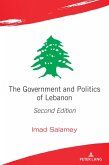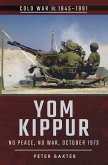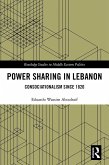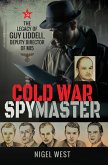When the world held its breath It is 25 years since the end of the Cold War, now a generation old. It began over 75 years ago, in 1944long before the last shots of the Second World War had echoed across the wastelands of Eastern Europewith the brutal Greek Civil War. The battle lines are no longer drawn, but they linger on, unwittingly or not, in conflict zones such as Iraq, Somalia and Ukraine. In an era of mass-produced AK-47s and ICBMs, one such flashpoint was the LevantIt is axiomatic that the recent history of much of the Eastern Mediterranean is linked to the creation of the state of Israel in May 1948, incontestably so. The country emerged from a series of conflicts and these have continued intermittently ever since, fuelled as much by ArabIsraeli enmity, national pride and territorial aspirations as hostile neighbours. Syria, Jordan, Lebanon and Egypt and in the latter phases, Iran were all part of it. There were rich pickings in the regions for the two great powers of the Cold War as they aligned with one side or the other, the Soviets in full support of Arab interests and the Jewish State enjoying the support of Washington. That combination not only led to several Middle Eastern wars but, as we are able to observe in todays news reports, the knock-on effect continues in Lebanon, Jordan, Egypt and Syria especially. For much of the period under review it was Lebanon that took the brunt of it, with resident Christian, Sunni, Shiite as well as Israeli interests deploying multiple levels of force much of it clandestine to jockey for predominance. Throughout, land, sea and air forces were involved.Al Venter has devoted a good deal of his career towards covering these developments, from the early 1970s all the way through to the end of the Lebanese civil war in 1991. He has been to war with both Arab and Jew (he was with the IDF strike force headed by Ariel Sharon when he entered Beirut in 1982); spent time in Syria (visited that countrys southern front adjacent to the Golan Heights); been on combat missions with the Israeli-backed South Lebanese Army in the Druze homeland adjacent to Mount Heron and has been embedded with the Lebanese Force Command along Beiruts Green Line, where many of his photos used in this publication were taken. Venter also spent a lot of time in South Lebanon with UNIFIL, the United Nations Interim Force in Lebanon, and was able to observe from up close the growing influence of the Pasdaran, Tehrans surrogate force in the region that eventually spawned Hezhollah. His last visit, in 1997, included contacts while hosted by Lebanese President General mile Lahoud with senior Iranian-supported Hezbollah elements in Beirut, one of few Western correspondents to have achieved this distinction.
Dieser Download kann aus rechtlichen Gründen nur mit Rechnungsadresse in A, B, BG, CY, CZ, D, DK, EW, E, FIN, F, GR, HR, H, IRL, I, LT, L, LR, M, NL, PL, P, R, S, SLO, SK ausgeliefert werden.









